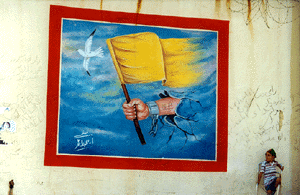Or is it? While I slept soundly in the saftey and comfort of my house here in Hilversum, you guys you were faced with the rattle of gunfire and the thump of exploding rocket-propelled grenades. So far the violence in the city I love so very much has left dozens of people dead.
 Yet I can't say I am really surprised. After all, we are talking about a country that has faced a brutal and bloody civil war fought along sectarian lines.
Yet I can't say I am really surprised. After all, we are talking about a country that has faced a brutal and bloody civil war fought along sectarian lines.The war stopped almost overnight, leaving the country traumatised. But hey this is Lebanon. No fingerpointing. No guilt question. Just pick up the pieces and get on with it. But get on with what? The country has again become a ticking timebomb, with many parties - in and outside Lebanon - vying for power.
So far it seems Hezbollah came in first. The Hezbollah drums of victory could be very shortlived though, for even though the party still has a lot of support resounding through all walks of life in Lebanon, the group might very well be on the verge of overplaying its hand.
 It flexed its muscles thereby using its magical and favourite word 'resistance', but what happened in the streets of Beirut these last few days brings back haunting memories of old-fashioned militia fighting in the days of the civil war rather than images of Super Nas (Hezbollah's charismatic leader Hassan Nasrallah) doing his so-called bit for God and country.
It flexed its muscles thereby using its magical and favourite word 'resistance', but what happened in the streets of Beirut these last few days brings back haunting memories of old-fashioned militia fighting in the days of the civil war rather than images of Super Nas (Hezbollah's charismatic leader Hassan Nasrallah) doing his so-called bit for God and country.And now we are getting closer to the real root of all evil in Lubnan. As BBC journalist Roger Hardy pointed out in one of his articles: Is Lebanon an Arab or a non-Arab state? Should it look to the East or to the West? How should its mosaic of Muslim and Christian communities - officially 18 in all -share power?
In 1943 the political elite attempted to solve this power-sharing problem through the National Pact which stated that the president would be a Maronite Christian, the prime minister a Sunni Muslim and the speaker of parliament a Shia Muslim.
Over time, however, the consensus that underpinned this power structure has eroded because of the changing demographic make-up of the country. The Christians, originally a majority, became a minority due to migration factors. The dominant Maronite-Sunni alliance came under challenge from the historically marginalised Shia - the largest minority in a nation of minorities.
 Throw in the Palestinian element in the delicate religious equation and you have all the ingredients that - in 1975 - eventually led to an all out civil war. It is estimated that more than 100,000 were killed, another 100,000 maimed, and approximately 17,000-20,000 people are still unaccounted for.
Throw in the Palestinian element in the delicate religious equation and you have all the ingredients that - in 1975 - eventually led to an all out civil war. It is estimated that more than 100,000 were killed, another 100,000 maimed, and approximately 17,000-20,000 people are still unaccounted for. Eighty per cent of the killed, injured, and missing were civilians with no militia affiliation. During sixteen years of war, both Christian and Muslim militias killed thousands in massacres, usually in retaliation for attacks carried out by the opposing side.
Eighty per cent of the killed, injured, and missing were civilians with no militia affiliation. During sixteen years of war, both Christian and Muslim militias killed thousands in massacres, usually in retaliation for attacks carried out by the opposing side. So where does that leave my friends in Lebanon- Christians and Muslims? I have no idea. For the time being they are all A-okay. I know because I spoke to Samira earlier. That said, this is still Lebanon we are talking about. The tables can be turned at the speed of light. So, please be safe Samira, your mother, Eva, Ahmad, H&H, Rose, the singing colleague...
